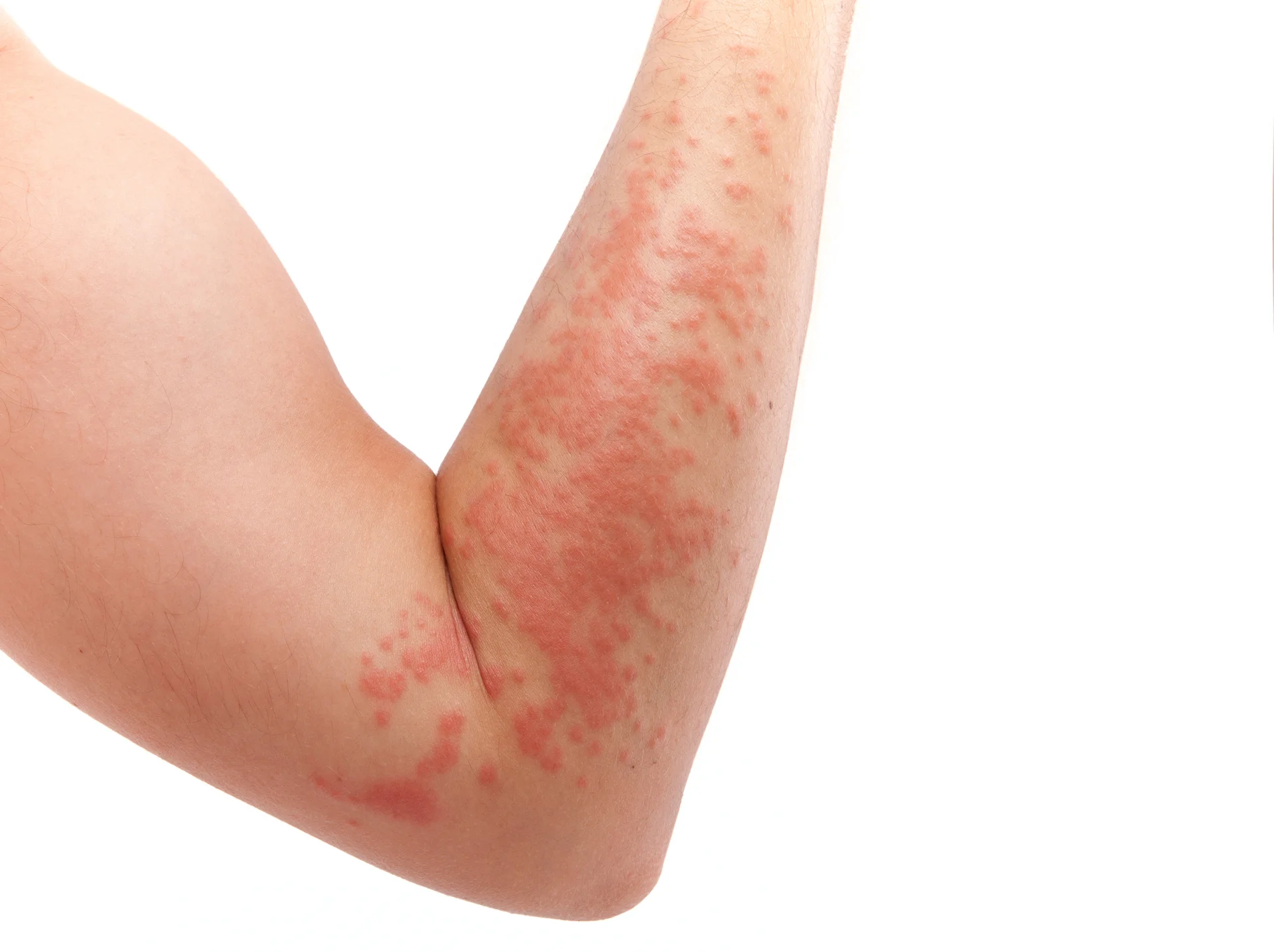The Battle Against Hives: A Focus on Histamine and Diamine Oxidase
Hives, or urticaria, can be a tricky symptom of histamine intolerance. This condition comes from having too much histamine. Your body naturally produces histamine, a compound involved in local immune responses as well as regulating physiological function in the gut.
A crucial player in maintaining this delicate balance is an enzyme called Diamine Oxidase (DAO). DAO’s function involves breaking down histamine within the body, ensuring a balanced histamine level. But if DAO levels are low, histamine can accumulate, potentially leading to symptoms like, you guessed it, hives!
What Exactly are Hives (Urticaria)?
Hives, medically known as “urticaria”, are raised, often itchy patches on the skin that can suddenly appear. They can vary in size, shape, and location, appearing in different forms and sizes.
On darker skin, hives may be slightly lighter or darker than the natural skin color, while on light to medium skin, they usually appear as red or pink spots.
Hives come and go quite quickly – each hive typically stays around for less than 24 hours. It’s worth mentioning that hives can also persist over time in some cases, known as chronic urticaria or chronic spontaneous urticaria.
What Causes Hives?
Hives, or urticaria, can appear due to various triggers including specific foods, medications, infections, emotional stress, or environmental changes.
Allergies, which can be linked to food types, bug bites or stings, latex, certain medicines, pets, plants, or pollen, are common culprits. Sometimes, infections or specific medical treatments might also prompt hives.
The emergence of hives is fundamentally tied to the release of a chemical in our bodies known as histamine. Stored in our mast cells, histamine is released when our immune system perceives a threat.
Triggers can vary greatly, ranging from dietary choices and exposure to allergens to hormonal shifts. Despite all this, pinpointing the exact cause of hives can sometimes remain a mystery.
Histamine Intolerance: When Histamine Becomes a Problem

Histamine intolerance is a condition where there’s an imbalance between the build-up and breakdown of histamine, a naturally occurring compound in our bodies. This can result in excess histamine, leading to a variety of symptoms. Although the symptoms can resemble those of an allergy, histamine intolerance is not an allergy.
Common Symptoms of Histamine Intolerance (HIT)
People with HIT can experience a wide range of symptoms. Here are some of the most common ones:
| Symptoms | Description |
| Headaches or migraines | Frequent or severe headaches |
| Nasal congestion or sinus issues | Blocked or stuffy nose, sinus pressure |
| Fatigue | Feeling tired or low on energy |
| Skin issues | Hives, an itchy skin rash, or worsening eczema |
| Nose and eye issues | Congested, runny, or itchy nose; red, itchy, or watery eyes |
| Digestive issues | Bloating, diarrhea, irritable bowel syndrome |
| Other symptoms | Unexplained itching (urticaria), low blood pressure, irregular periods |
The Connection Between Histamine Intolerance and Hives
HIT might be linked to chronic urticaria. Research points out that excessive amounts of histamine, from either too much in your diet or difficulty metabolizing it, could trigger recurring hives.
It’s suggested that if you’re dealing with persistent hives, HIT could be a possible cause. Addressing histamine intolerance could potentially help manage hives, with methods including changes to diet, taking DAO supplements, and using antihistamines.
Foods to Avoid in Histamine Intolerance
For people with histamine intolerance, certain foods that are high in histamine or that trigger histamine release can aggravate the clinical symptoms of HIT. Below is a list of some histamine-rich foods:
- Aged cheeses
- Fermented foods
- Alcohol, especially wine and beer
- Cured meats
- Citrus fruits
- Certain kinds of fish, like tuna and mackerel
- Tomatoes
Diagnosis of Histamine Intolerance
Diagnosing histamine intolerance (HIT) is not as straightforward as some other conditions because there’s no definitive test for it. However, doctors use several methods to gauge whether someone is dealing with HIT.
One of the potential indicators for histamine intolerance is a deficiency in an enzyme called diamine oxidase (DAO). DAO plays a vital role in breaking down excess histamine in the body.
So, having DAO deficiency can make it harder for your body to handle excess histamine, leading to HIT and the various symptoms that come with it.
Blood tests that measure histamine levels and DAO have not been shown to consistently correlate with symptoms. Given the limitations of testing, doctors often rely on practical diagnostic methods.
These can include a trial of a low-histamine diet or elimination diet, keeping a symptom diary, or trialing antihistamines. If your symptoms improve under these conditions, it could suggest that you are dealing with HIT.
Harnessing Diamine Oxidase (DAO) to Alleviate Symptoms of Histamine Intolerance
The adverse reactions, such as hives, resulting from histamine intolerance symptoms can significantly affect one’s life. However, research is revealing a potential solution that could provide symptom relief for people with histamine intolerance or with low levels of Diamine Oxidase in the body.
What is Diamine Oxidase?
DAO is an enzyme produced in your digestive system, specifically within the intestinal mucosa. Its primary job? To break down and neutralize excess histamine in your body.
By doing so, DAO helps regulate histamine levels and prevent histamine overload. Histamine N-Methyltransferase (HNMT) is another enzyme that aids in histamine metabolism, working hand in hand with DAO to regulate histamine levels in our bodies.
When DAO levels in your body are low, histamine can accumulate and trigger intolerance symptoms like hives. To help counteract this, DAO supplements are designed to increase the amount of this enzyme in your body. With additional DAO, your body can potentially better handle excess histamine.
Linking DAO and Hives – What Recent Studies Show
Emerging research suggests that DAO supplements might help people dealing with hives due to histamine intolerance. In one controlled study, people with chronic hives who had low DAO levels found that after taking DAO supplements, they could reduce their dose of antihistamine medication.
In another study, patients with histamine intolerance experienced fewer digestive symptoms – and these symptoms were less intense – after taking DAO supplements for four weeks.
While these findings hint at the potential of DAO supplements in managing histamine-related hives, it’s crucial to note that DAO supplements are not a complete cure for histamine intolerance. More research is needed to fully understand the dynamics between DAO and hives.
The implications of these studies for understanding and managing hives are substantial. It seems that for some individuals, histamine intolerance might be an underlying cause of hives, and DAO supplements could offer an effective treatment option.
However, it is always essential to seek a proper medical diagnosis to rule out other potential causes of your symptoms.
If you suspect histamine intolerance, discussing these diagnostic methods and potential treatments with your healthcare provider will help determine the best course of action for you.
Conclusion
Specific interventions such as a low-histamine diet or an elimination diet can play a vital role in managing symptoms and providing relief. Some studies also suggest the beneficial potential of DAO supplements for individuals experiencing histamine intolerance.
However, each individual’s response to these interventions can be unique, and as such, any diagnosis and treatment should be personalized, carefully tailored, and carried out under professional medical supervision.
Enhance Your Histamine Balance with Our DAO Supplements
In your quest to manage hives and histamine intolerance symptoms, we at SeeBeyond Shop are proud to present our Diamine Oxidase (DAO) supplements.
Our high-quality DAO supplements are designed to boost your body’s ability to break down histamine, helping to ensure a balanced histamine level. Particularly beneficial for those suffering from symptoms due to histamine intolerance, these supplements aim to help you feel your best by curbing conditions such as hives.
However, supplementation should not replace a balanced diet and healthy lifestyle. We recommend pairing our DAO supplements with a low-histamine diet and other lifestyle changes for optimal results.
Start your journey to better histamine balance today with our DAO supplements!
